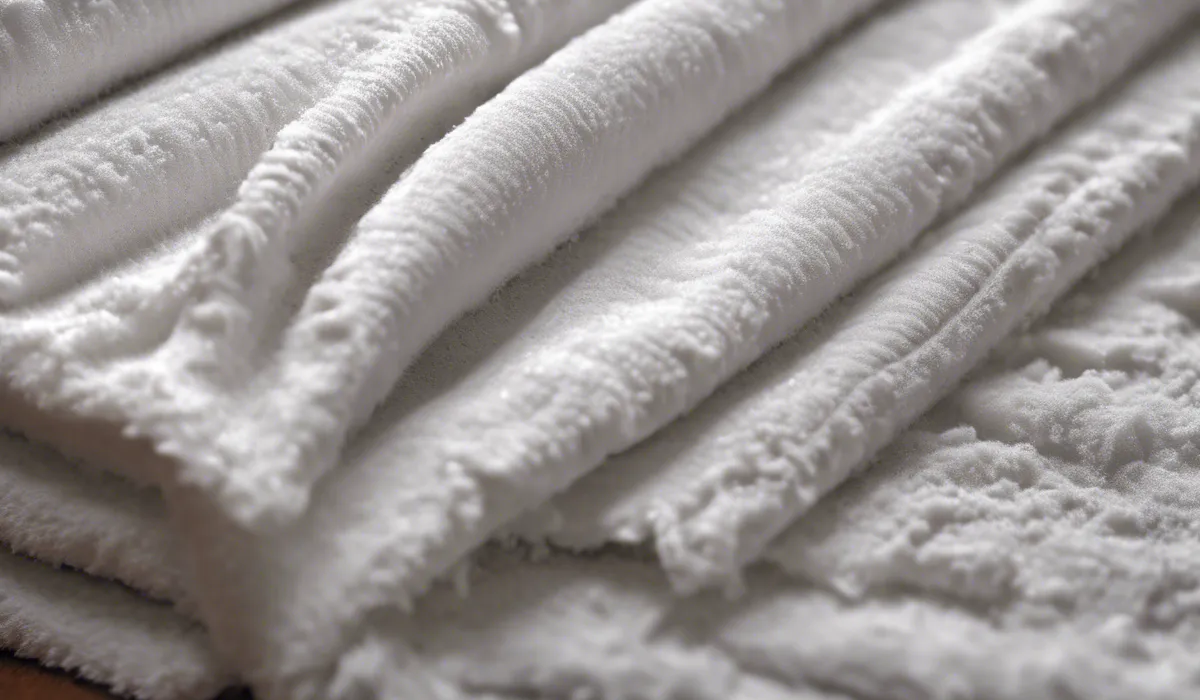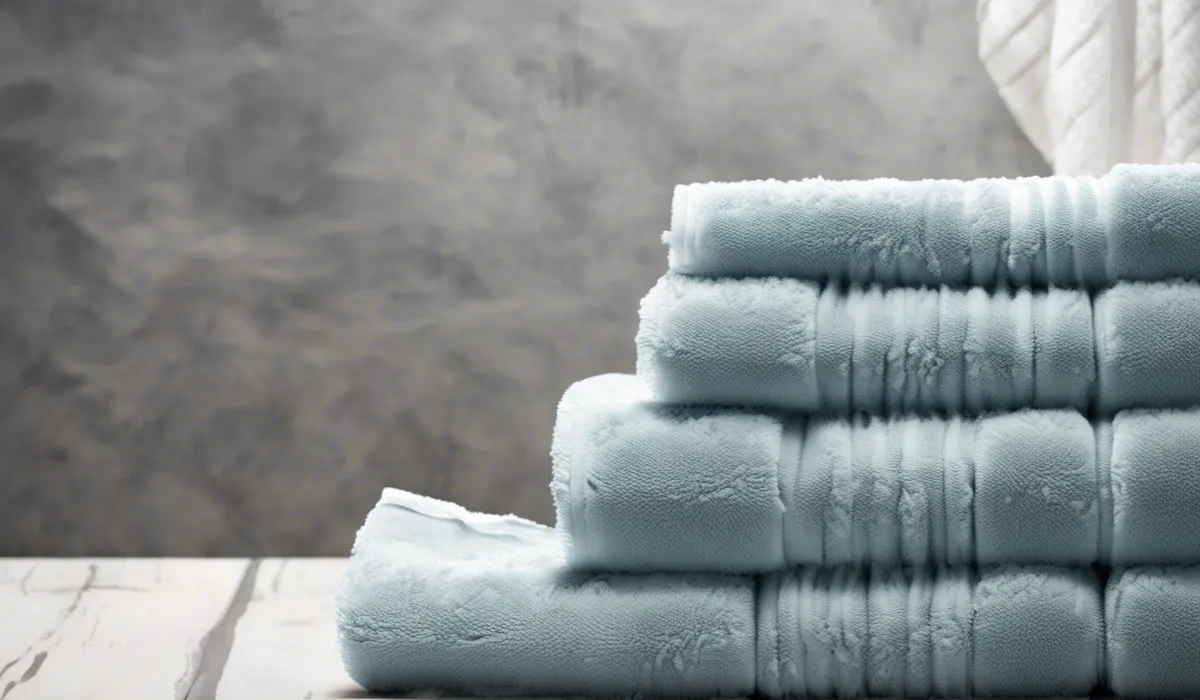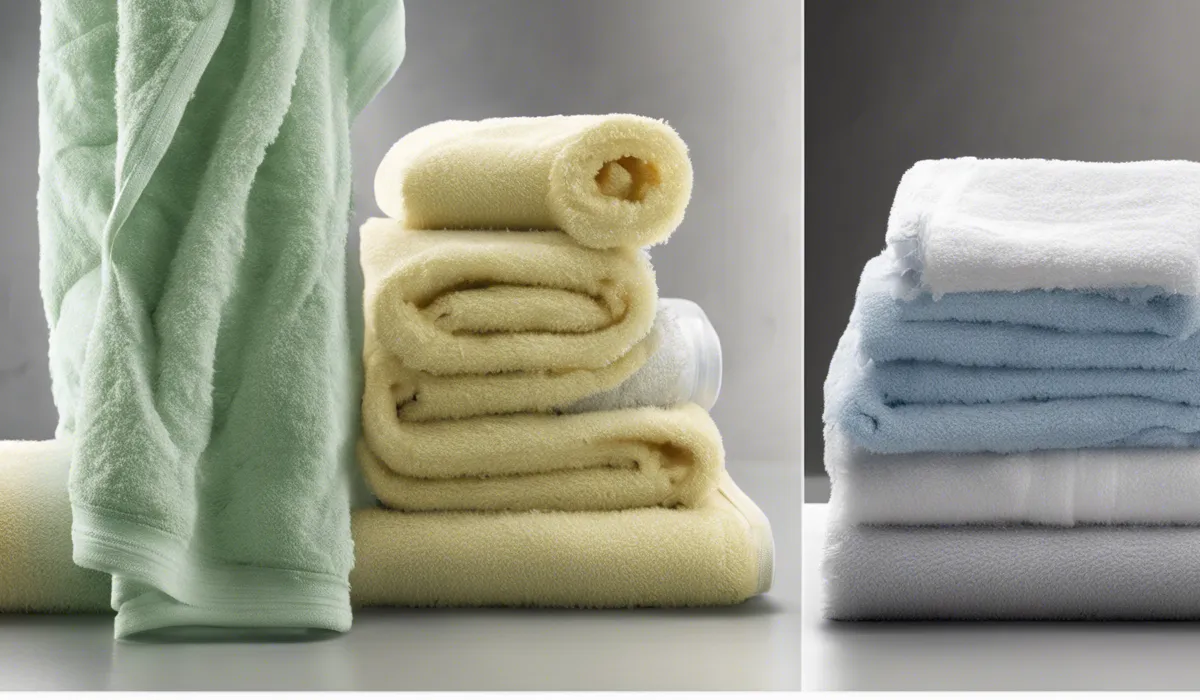Yes, towels can grow mold if they remain damp or are stored in a moist environment. Mold thrives in wet, humid conditions, making towels susceptible. To prevent mold, dry towels completely after use and store them in a dry, well-ventilated area.
Causes of Mold Growth on Towels

High Humidity and Dampness in Bathrooms
Towels are especially vulnerable to mold growth because bathrooms often have high humidity levels.
After a hot shower, steam fills the air, settling on surfaces, including towels. If these towels are not dried properly, the moisture creates an ideal environment for mold spores to flourish.
It’s like a tropical rainforest, where mold loves to live. To keep the bathroom air as dry as a toilet flange in the desert, it’s important to use fans or open windows to reduce moisture.
Infrequent Washing or Drying Practices
When towels are not washed or dried frequently, they can become a playground for mold. Imagine wearing the same socks for a week, not a pleasant thought, right? Similarly, towels need to be cleaned regularly.
If they remain damp for too long after use, or if they are folded and put away while still slightly wet, mold can start to throw a party.
It’s always best to dry towels completely before folding them, just as you would make sure your 2500 reel is dry before storing it after a fishing trip.
Poor Ventilation and Air Circulation
Good air flow is like a breath of fresh air for your towels. In a bathroom with poor ventilation, the air can become stagnant, much like a pond with no outlet.
This allows mold to settle in and grow. Ensuring proper ventilation is like creating a breeze that sweeps away the mold spores, keeping the bathroom and towels as fresh as a birding adventure in the great outdoors.
Residual Organic Matter and Soap Scum
Leftover organic materials, such as skin cells, oils, and soap scum, are like a buffet for mold. These residues on towels can feed mold and encourage it to grow.
It’s similar to leaving crumbs on the kitchen counter – soon enough, unwanted guests will arrive for the feast.
Keeping towels clean is like keeping your kitchen spotless; it discourages mold from making itself at home.
Warmth and Darkness in Storage Areas
Mold loves warm and dark places, much like a bear hibernating in a cave. When towels are stored in such conditions, they become an ideal habitat for mold.
It’s important to store towels in a space that is as bright and airy as a ceiling box to discourage mold growth.
Health Risks and Impacts of Moldy Towels

Allergic Reactions and Respiratory Issues
Using moldy towels can trigger allergies and breathing problems, similar to how pollen affects some people during springtime.
The presence of mold can cause sneezing, coughing, and wheezing, turning your bathroom routine into an unwanted adventure.
It’s vital to keep towels mold-free to ensure your home is as safe as a well-planned Alaska cruise.
Skin Irritation and Infections
Wiping your body with a moldy towel can be as uncomfortable as wearing an itchy sweater.
The mold can cause skin irritation or even infections, making your skin as unhappy as a cat in a bath.
It’s essential to use clean towels to keep your skin as comfortable as a pair of well-fitting shoes.
Musty Odors and Stains on Towels
Mold on towels can produce a musty odor, turning your fresh linen closet into a smelly locker room.
The stains and smells of mold are as unwelcome as a skunk at a picnic. Keeping towels clean helps maintain a fresh and inviting environment in your home.
Long-Term Mold Exposure Concerns
Just like too much sun can harm your skin over time, prolonged exposure to mold can lead to more serious health concerns.
It’s like living with a hidden leak in your house – eventually, it can cause significant damage. By preventing mold growth on towels, you’re taking steps to protect your health in the long run.
Prevention and Remediation Strategies

Regular Washing and Proper Drying Techniques
Preventing mold on towels starts with regular laundering, just like brushing your teeth prevents cavities.
Using hot water and drying towels completely, whether outside in the sun or in a hot dryer, is the key.
It’s like making sure your clothes are as dry as a ceiling box before putting them away.
Use of Anti-Microbial Towels and Linens
Anti-microbial towels are like having a shield against mold.
These towels are treated to resist mold growth, offering an extra layer of protection in the battle against dampness and bacteria.
It’s an investment in your health, much like choosing the right gear for a birding trip.
Ensuring Adequate Ventilation and Humidity Control
Keeping the air moving and controlling moisture levels in your bathroom is crucial in preventing mold growth.
This is like ensuring there’s enough air flow in a tent when camping to keep it comfortable and dry.
A dehumidifier or an exhaust fan can work wonders in maintaining a mold-free environment.
Natural and Chemical Remediation Methods
If mold does appear, it’s not the end of the world. Remediation methods, from natural solutions like vinegar and baking soda to chemical mold removers, can help restore your towels.
It’s like dealing with a weed in the garden; with the right tools, you can get rid of it and keep your garden beautiful.
Best Practices for Storing Towels to Prevent Mold Growth
Storing towels properly is as important as packing a suitcase for a trip. You wouldn’t pack a wet swimsuit with your clothes, just like you shouldn’t store damp towels in a dark closet.
Ensuring towels are completely dry and stored in a well-ventilated area is essential to prevent mold from setting up camp.
FAQs About Towel Mold Growth
Can towels develop mold if they’re left damp?
Yes, towels can develop mold if they are left damp, as mold thrives in moist and humid conditions.
What conditions cause towels to become moldy?
Towels become moldy when stored in a moist environment or if they do not dry out completely after use.
How can I prevent my towels from growing mold?
To prevent mold growth, ensure towels are thoroughly dried after each use and stored in a dry, well-ventilated area.
Is it safe to use a towel that has mold on it?
It is not safe to use a moldy towel as it can cause skin irritations and allergies; it should be washed or discarded.
What should I do if my towel has mold on it?
If your towel has mold, wash it with hot water and detergent, preferably with a fungicide or bleach if the fabric allows, and dry it thoroughly.
Final Thoughts
Towels are prone to mold growth when left damp or stored in humid conditions, as mold flourishes in moisture-rich environments.
Ensuring towels are thoroughly dried after use and kept in a well-ventilated, dry area is crucial for preventing mold development and maintaining towel hygiene.
